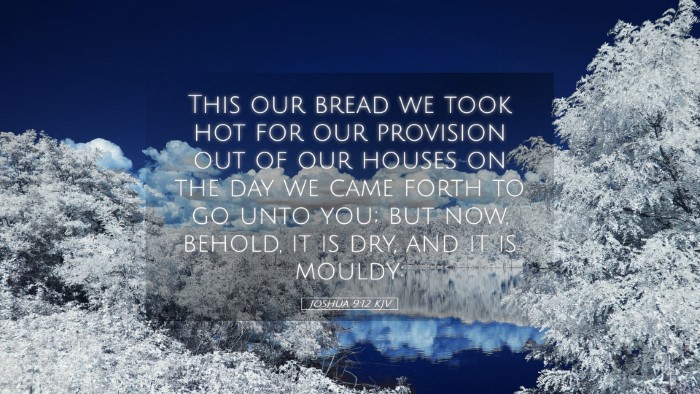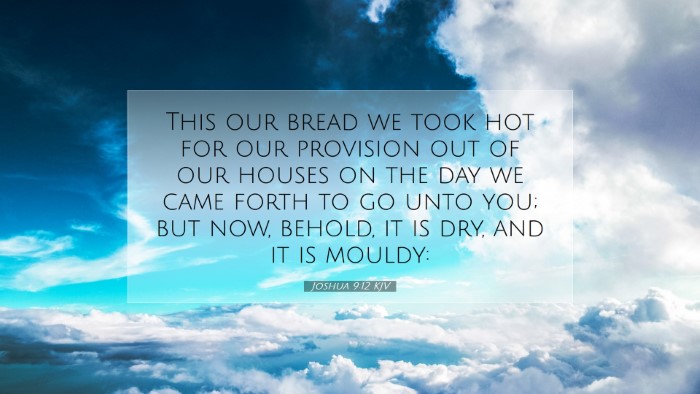Commentary on Joshua 9:12
Joshua 9:12 states: “This our bread we took hot from our ovens, when we came forth from our houses; but now, behold, it is dry, and it is mouldy.” This verse captures a significant moment in the narrative where the Gibeonites deceitfully present themselves to the Israelites.
Contextual Background
The Gibeonites, recognizing the threat posed by Israel, devised a plan to save themselves from destruction. They pretended to be ambassadors from a distant land, bringing gifts and provisions that hinted at a hospitality that would appeal to the Israelites. The ploy was designed to mislead Joshua and the leaders of Israel into forming a covenant with them.
Insights from Public Domain Commentaries
Matthew Henry's Commentary
Matthew Henry highlights that the Gibeonites were strategic in their approach, using material evidence (the old bread) to fabricate a story of travel from far away. He notes that their presentation was calculated to invoke sympathy and trust with the Israelites. Henry emphasizes that improvised narratives can be effective instruments for manipulation, showcasing the peril of unguarded decision-making without seeking divine counsel.
Albert Barnes' Commentary
Albert Barnes elaborates on the practical implications of the Gibeonites' actions. He points out that the moldy bread served as a symbol of their supposed journey and hardship. Barnes underscores the dichotomy of appearances versus reality; what looks convincing may still be a façade. This lesson highlights the critical need for discernment, particularly in situations requiring spiritual wisdom and leadership. He further suggests that the Israelites failed to inquire of the Lord, underscoring the necessity of seeking divine guidance before making decisions.
Adam Clarke's Commentary
Adam Clarke delves into a detailed examination of the Gibeonites’ claims, discussing the cultural and historical context of their deception. He points out that their act of showcasing the old bread was not just a mere detail but a calculated tactic reinforcing their narrative of being travelers. Clarke emphasizes the theme of deception and its implications within the broader biblical narrative, connecting it to the moral and ethical challenges faced by Joshua and the Israelites in their conquest of Canaan. His reflections serve as a reminder to remain vigilant against deceit and to uphold integrity in actions and decisions.
Theological Implications
This verse and the surrounding narrative speak volumes about the nature of truth and deception. It is essential for leaders, particularly in ecclesiastical settings, to exercise discernment and seek genuine wisdom from God. The events surrounding Joshua 9:12 illustrate the potential consequences of hasty decisions borne out of trust without verification.
Lessons for Today
- Discernment is critical: Christian leaders must consistently rely on prayer and seek God’s guidance in decision-making processes.
- Be wary of appearances: Just as the Gibeonites presented themselves with deceptive evidence, leaders today must not rely solely on what seems right externally.
- Integrity in leadership: There is a profound responsibility placed on those in authority, underscoring the need to protect the integrity of their decisions.
- The importance of community: Engaging with the broader community of faith provides a safeguard against individual biases and deception.
Conclusion
In conclusion, Joshua 9:12 serves as a pivotal reminder of the complexities of human interactions and the potential for deception. The intricacies of the biblical narrative invite pastors, students, theologians, and scholars to glean wisdom from the mistakes of Israel and the cunning of the Gibeonites. As we navigate similar challenges in contemporary contexts, may we remain steadfast in our commitment to seek the truth and uphold divine guidance in our leadership and interactions.


